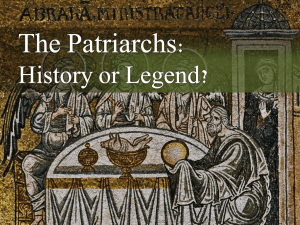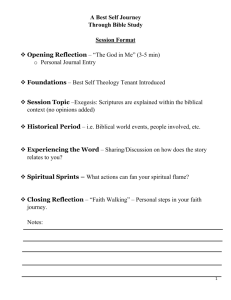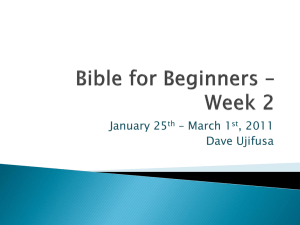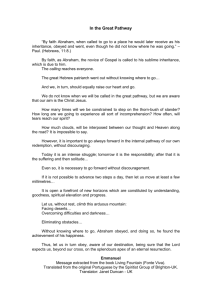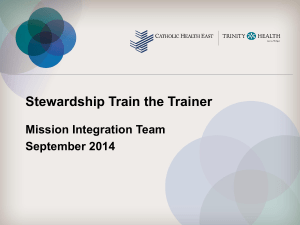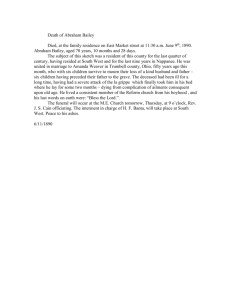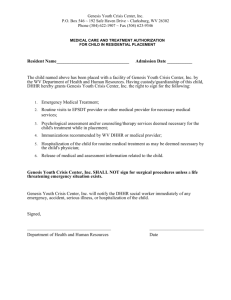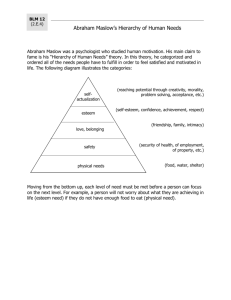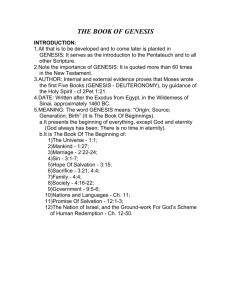Word - Ave Maria Press
advertisement
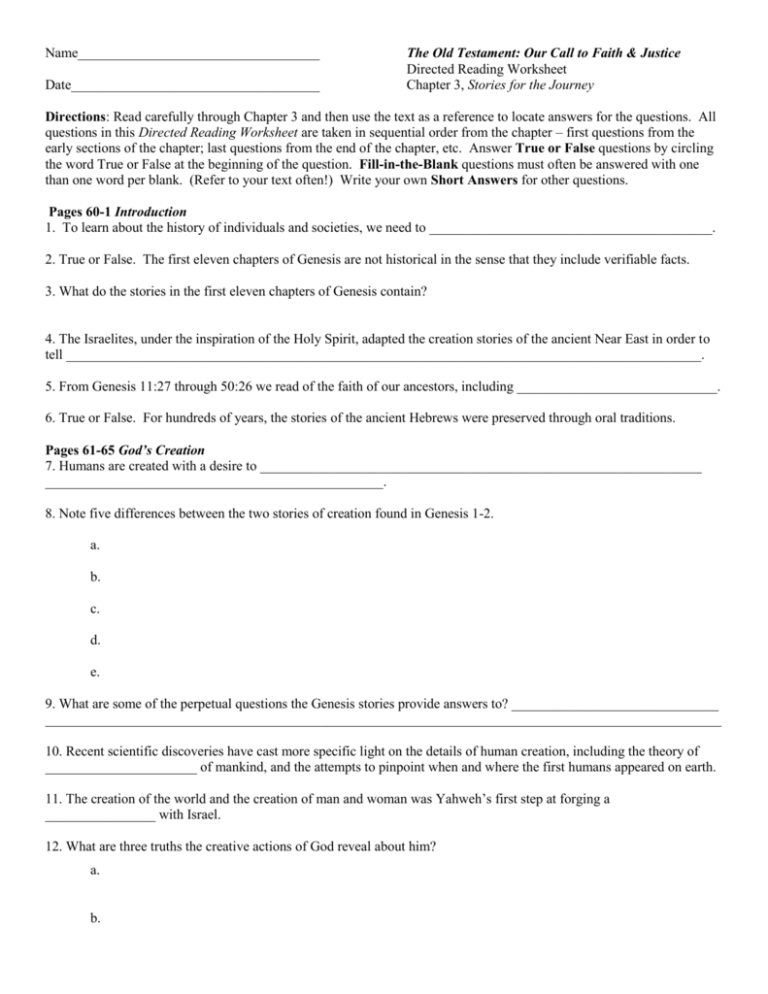
Name___________________________________ Date____________________________________ The Old Testament: Our Call to Faith & Justice Directed Reading Worksheet Chapter 3, Stories for the Journey Directions: Read carefully through Chapter 3 and then use the text as a reference to locate answers for the questions. All questions in this Directed Reading Worksheet are taken in sequential order from the chapter – first questions from the early sections of the chapter; last questions from the end of the chapter, etc. Answer True or False questions by circling the word True or False at the beginning of the question. Fill-in-the-Blank questions must often be answered with one than one word per blank. (Refer to your text often!) Write your own Short Answers for other questions. Pages 60-1 Introduction 1. To learn about the history of individuals and societies, we need to _________________________________________. 2. True or False. The first eleven chapters of Genesis are not historical in the sense that they include verifiable facts. 3. What do the stories in the first eleven chapters of Genesis contain? 4. The Israelites, under the inspiration of the Holy Spirit, adapted the creation stories of the ancient Near East in order to tell ____________________________________________________________________________________________. 5. From Genesis 11:27 through 50:26 we read of the faith of our ancestors, including _____________________________. 6. True or False. For hundreds of years, the stories of the ancient Hebrews were preserved through oral traditions. Pages 61-65 God’s Creation 7. Humans are created with a desire to ________________________________________________________________ _________________________________________________. 8. Note five differences between the two stories of creation found in Genesis 1-2. a. b. c. d. e. 9. What are some of the perpetual questions the Genesis stories provide answers to? ______________________________ __________________________________________________________________________________________________ 10. Recent scientific discoveries have cast more specific light on the details of human creation, including the theory of ______________________ of mankind, and the attempts to pinpoint when and where the first humans appeared on earth. 11. The creation of the world and the creation of man and woman was Yahweh’s first step at forging a ________________ with Israel. 12. What are three truths the creative actions of God reveal about him? a. b. 2 c. 13. The first story of creation reveals that human beings have been created by God with both a ___________ and a _______________. We share in the __________________ of God because we are intended to be temples of the Holy Spirit, and we are to regard the human body as ________________. We must honor it because God has created it and will raise it on the last day. 14. The ongoing revelation of God is the subject of the Old Testament and serves as a prelude to the ____________________ and God’s full revelation in _________________ in the New Testament. 15. True or False. There are no other discussions of Creation in the Bible outside the book of Genesis. Pages 65-67 Original Justice and the Fall of Man 16. The second creation story teaches us that the first man was created _________________________________________ __________________________________________________________________________________________________ 17. The Church teaches that Adam and Eve were created in a state of grace known as “________________ justice.” 18. What were four gifts of original justice? a. b. c. d. 19. True or False. Genesis 3 uses figurative language to describe the fall of man and does not describe an actual deed that took place. 20. The basic root of sin is __________________________________________________________________________ 21. The original sin, in essence, is that _______________________________________________________________. 22. Adam and Eve lost the harmony of original justice. What are the unfortunate side effects of this? 23. In Genesis 3:15 God promised a __________________ for the fallen mankind. The woman’s offspring, mentioned in the passage is __________________________. 24. Sin spread quickly after Adam and Eve. __________________ murder of his brother _________________ is a personal _____________ which arose from the shared _____________________ of humanity. 25. The doctrine of ___________________________ is an essential truth of the faith. Without it, the mystery of __________________ is undermined because we do not need the salvation offered through Christ. Pages 67-70 Renewal of Life 26. In a Eucharistic prayer used at Mass we are reminded that God’s revelation was not broken by the sin of Adam and Eve when it says, “________________________________________________________________________________ _______________________________.” 27. The next stage of God’s revelation is the covenant he made with _______________________. 3 28. One of the most famous flood legends of ancient Mesopotamia was the Epic of _____________________________. 29. What are unique teachings of the Hebrew version of the flood story? 30. Summarize the theory about the preponderance of ancient flood legends. 31. The story of the Tower of Babel occurs at a place called ________________ which is an ancient term the Bible often uses for _________________________. 32. Explain the two interpretations regarding the diversity of languages associated with the story of the Tower of Babel. 33. Summarize what the primeval history stories teach us about God and his will. Pages 71-74 Ancestors of Faith 34. The people and events from the time of Abraham onward can be placed in the historical setting of the Near East from between _______________-______________B.C. 35. How is Abraham the “father of all believers?” 36. Describe the order of the prominent Old Testament personalities in the book of Genesis. 37. How do those who closely study the Bible know the book of Genesis was written much later than the events it describes? 38. Bible scholarship has concluded that some of the ancestor stories repeat themselves because they were originally ______________________________ which were probably passed on by word or mouth long before they were ever written down. 39. When there are two versions of the same story, the different versions always use _____________________________. 40. In good translations of the Bible the name for God, “Yahweh,” will be translated consistently in one of these two ways: “___________” or “__________ _____________”. 41. Another tradition used a more generic name for Israel’s God, “Elohim,” which is usually translated as ____________. 42. A popular theory about the origins of the Bible is that there were originally ________________________________ of early stories and traditions. 43. One source, the _____ source, consistently used “Yahweh” as the name for God, while another tradition, the ____ source, used “Elohim” as the name for God. 4 44. Summarize the two possibilities for why the editors and writers decided to keep both versions of some stories. 45. What are the two ways we should read the ancestor stories of Israel? ______________________________________ __________________________________________________________________________________________________ Pages 75-79 Abraham: Father of Faith 46. _____________ is the first patriarch of the Jewish faith who, with his wife _____________, and his descendants, make up the nation of people from whom God would bring salvation. 47. True or False. Abraham was a mighty general whose native land was Palestine. 48. Using the map on page 75, estimate the distance Abraham and his family traveled before settling in Canaan. 49. Explain how Abraham’s journey foreshadows the one the Hebrews will later make in later stages of history. 50. Name the four people God makes a covenant with in the Old Testament. 51. Explain the covenant agreement between God and Abraham. 52. The two signs of God’s covenant with Abraham are the change in his _____________ and, more importantly, the sign of ____________________. 53. Abraham’s faith in God’s promises is considered an act of __________________________. 54. An important theme in the early ancestor stories of Abraham is ____________________ which have been promised to him and his descendants by God. 55. What are two “threats” to the blessings promised to Sarah and later Abraham? 56. What is the “external threat” to Abraham in Genesis 12:10-20? 57. What is the “internal threat” in Genesis 21:1-21? 58. In Genesis 16, ________ is so doubtful that she is really going to bear the promised descendants of Israel, she asks Abraham to have a son through ____________________, an Egyptian servant. This son’s name was _______________ and he is honored as the ancestor to the _____________ of the Arab peoples. 59. The story of Hagar illustrates that God’s ________________ extends beyond Abraham and his wife to Hagar and Ishmael. 5 60. The story of Hagar also clearly illustrates the “__________________________” as she and her son represent all three of these things: _______________,____________________,_____________when they are sent away by Abraham. 61. True or False. Abraham would have been shocked by God’s request for the sacrifice of his son. 62. There are two lessons in the story of Isaac’s sacrifice. First, Hebrews do not _________________________________, and second, Abraham’s ______________________________________________________________________________. 63. Explain how Christians can read the passage yet another way. 64. The stories of the patriarchs teach us to ____________ God as the giver of all _____________, and to continue to trust him even when things seem _______________________. Pages 79-81 The Blessing of Jacob 65. _____________ is a transitional character between the ________________ and _________________ stories. 66. Rebecca instructs _____________ to deceive his father Isaac, and to take his older brother, ___________’s, place. _____________ is fooled and Jacob gets his blessing. 67. Jacob fell in love with _________________ but had to marry _______________ first. 68. Genesis 32:22-32 tells of an unusual story of Jacob’s dream in which he _________________________ with God’s messenger at Jabbok. The messenger of God is in the form of a __________________. 69. As a consequence of this struggle Jacob is given a new name-- _______________, just as ________________ was renamed before him. The origins of the name are related to the verb “sara” means ___________________ and the first syllable of ________________, that is, God. 70. The reconciliation between Jacob and Esau represents the hope that ____________ can at times live in _____________ with __________________, especially the Edomites who are traditionally seen as descended from Esau. Pages 82-83 Joseph in Egypt: Foreshadowing the Exodus 71. What is the difference between the narrative about Joseph and the rest of the Genesis stories? 72. Joseph is able to use his office to protect the lives of his family who were in danger of _________________________ __________________________________. 73. Egypt had a massive, centralized economy served by thousands of ________________ and poor agricultrual _____________________. 74. Egypt famously hoarded impressive amounts of wealth, collected on the basis of ______________________________ from ________________ and the widespread ____________________________________________________________. 75. True or False. The Joseph narrative is based on an ancient Hebrew admiration for the achievements of Egypt. 76. True or False. The Joseph stories set the stage for the main event of the Old Testament: the Babylonian Exile. 77. True or False. One of the lessons of stories like Joseph and Daniel is that the Hebrews not only can survive outside the land of Palestine, but actually can prosper. 6 78. For whom did the stories of Joseph and Daniel provide hope and consolation?
